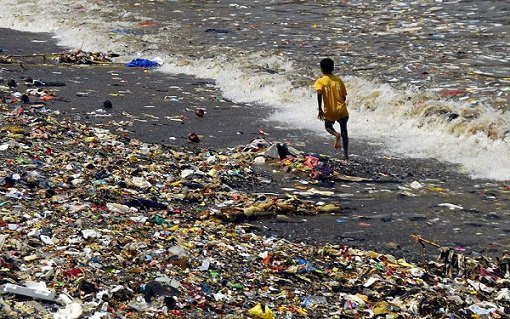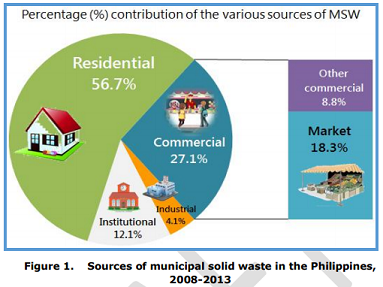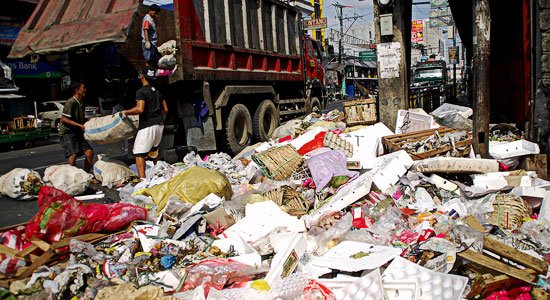Garbage Problem of the Philippines
One major environmental issue in the Philippines is proper garbage disposal. This issue has contributed to problems such as floods, serious diseases, water pollution, air pollution and even global warming. According to the reports of Ocean Conservancy and the McKinsey Center for Business and Environment (2015), the Philippines is one of the top contributors of plastic waste in oceans.

This is a severe problem that needs a serious attention from the government. However, as of now, there is no definite solution presented for this crisis. Government regulations such as anti-littering do not directly solve this problem since most people would just throw their garbage wherever they want in the absence of authority. Others do not care about the trash bins designated for biodegradable, non-biodegradable and recyclable trashes thus ignoring proper garbage segregation. For that reason, the government has to do something else for people to take heed of these rules.

According to DENR, municipal solid wastes (MSW) come from residential, commercial, institutional and industrial sources. Based on their 2008 – 2014 National Solid Waste Management Status Report, about 56.7% of MSW is accounted to residential waste. These include kitchen scraps, yard wastes, paper, cardboards, tissues, diapers, glass bottles and plastic containers. Commercial establishments and public or private markets contribute 27.1% while 12.1% comes from institutional sources such as government offices, as well as educational and medical institutions. The remaining 4.1% is then accounted to industrial and manufacturing sector. This report shows that over 50% of the generated wastes come from residential sources and below is the distribution of that 56% residential waste. I think it is self-explanatory.

Republic Act 9003 mandates the implementation of waste segregation and collection at the barangay level specifically for biodegradable and recyclable wastes while disposal and collection of non-biodegradable wastes are the responsibility of the city or municipality. However, in the case where communities and businesses do not practice segregation due to lack of awareness, appreciation and discipline, most solid waste would just end up as mixed garbage. Hence in the part of LGUs, they end up conducting mixed waste collection – a backward step that produces the opposite effect.

Collected mixed waste would just be deposited into existing dumpsites. Also, due to poor labor management and supervision of the LGUs, people just tend to throw their garbage to informal deposit sites, to rivers, creeks and canals or to wherever they want while others would even incinerate them as they find these more straightforward. Moreover, according to DENR’s report, people would likely blame uncollected garbage and dirty surroundings to the performance of local officials. Whatever is the cause for this ineffectiveness or whoever is to blame for this inefficiency, we are all going to suffer as a consequence. So the challenge now for the government would be instilling appreciation and discipline unto people towards their waste thus making existing rules more effective.
In Indonesia, a doctor came up with an idea of resolving his country’s excessive garbage problem while providing health care to residents who could not afford it. It’s like hitting two birds with one stone. He established a garbage insurance scheme which he calls Garbage Clinical Insurance (GCI) – a micro health insurance program which uses garbage as a financial resource. With this program, the community pays clinical services by using garbage in an insurance scheme. Watch the video below.
GCI allows residents to submit their garbage worth 10,000 IDR to cover up their health care and to cover up for the prevention of future illness and treatment. Through this, GCI also provides rehabilitative health care such as free treatment, in-clinic counseling, laboratory check, etc. They also conduct creative health education for communities to be informed about serious diseases. In other words, people only need to give their waste to GCI, and then the GCI will increase the waste’s economic value by turning organic garbage into fertilizer and using inorganic materials to make recyclables. In return, the residents acquire free healthcare. The primary goal of GCI is to change people’s perceptions and habits towards garbage collection and disposal. Through this concept, people would be aware that with proper waste management, they can get more health benefits. GCI believes that more people will be inspired into adapting this scheme if this idea is acknowledged.
The Proposed Solution
It is therefore important to ask the government to implement a similar program for the purpose of efficient segregation of waste, through the creation of an agency or organization. This organization should coordinate with local Materials Recovery Facilities (MRFs). This program aimed to encourage people to manage their waste as they can get benefits from the government and help MRFs with their efforts. The following should be considered:
The government should support the organization’s method on putting value on garbage. We could not eliminate garbage entirely, but such program will definitely decrease the amount of garbage that ends up in dumpsites.
The government should also finance the construction of said organization’s facilities where people can drop off their segregated waste in exchange for points. These points can then be used as payments for government bills, electric bills, medication bills, tuition fee, grocery etc. However, conversion of these points into money should not be allowed. Points should vary depending on the types of waste and the determination of these variations should be the organization’s responsibility. For example, organic waste should have less corresponding points than inorganic waste since the composting process involving organic waste does not cost much capital.
The organization should be responsible for the development and research on how the government would profit from the collected waste. The organization should also provide facilities dedicated for research and innovation regarding with the collected waste. One successful example of such innovation is in the case study of Appiah et al, where they used plastic waste materials for road construction in Ghana. In addition, the organization could also generate job opportunities for young aspiring researchers in the country.
I know that before a plan is concluded to be effective, it should first undergo thorough observation. Determination of possible cause for failure should also be carefully done. And there is no other way to test the efficiency of this system other than implementing it. Therefore I humbly ask the Philippine Government to conduct this experiment in a small area or city, determine its impact and deliver a result in a reasonable period of time.
References:
[1]http://www.mckinsey.com/business-functions/sustainability-and-resource-productivity/our-insights/saving-the-ocean-from-plastic-waste
[2]http://nswmc.emb.gov.ph/wp-content/uploads/2016/06/Solid-Wastefinaldraft-12.29.15.pdf
"ANNOUNCEMENT REGARDING THE FIRST MONTHLY CHALLENGE FOR A BETTER PHILIPPINES"
To all Filipino Steemians who are interested to participate in the said event, please do a comprehensive RESEARCH about the GARBAGE PROBLEM in our country. Examine how serious this particular issue is and find out governments’ actions in addressing the said problem. You may also evaluate the efficiency of these solutions as a preparation for this event. BUT DO NOT POST ANYTHING YET AS THE EVENT HAS NOT OFFICIALLY STARTED.
THE EVENT WILL START ON SEPTEMBER 28, 2017. SO YOU STILL HAVE 4 DAYS TO DO YOUR RESEARCH. A SPECIFIC QUESTION REGARDING THE PROBLEM WILL BE GIVEN AND YOU WILL PROVIDE A BRIEF SOLUTION REGARDING THAT PARTICULAR QUESTION IN YOUR ENTRY. THANK YOU!
CLICK THIS AND READ THE GUIDELINES OF THE EVENT
FILIPINO TRANSLATION
Para sa lahat ng mga Filipino Steemians na nagbabalak sumali sa event na ito, paki-usap gumawa kayo ng komprehensibong research patungkol sa problema natin sa basura. Suriin kung gaano ka lala ang problema natin sa basura at alamin ang mga ginagawang hakbang ng ating gobyerno para resolbahin ang problemang ito sa bansa. Pwede kayo gumawa ng draft at i-evaluate kung gaano ka epektibo itong mga hakbang na ito ng gobyerno. HUWAG MUNA MAG POST NG ENTRY DAHIL HINDI PA OFFICIAL NA NAGSIMULA ANG EVENT.
ANG EVENT AY NAKATAKDANG SISIMULAN SA SEPTEMBER 28, 2017. MERON PA KAYONG 4 NA ARAW PARA GAWIN ANG INYONG RESEARCH. MAGBIBIGAY AKO NG PARTIKULAR NA TANONG UKOL SA PROBLEMA NATIN SA BASURA. YUN ANG GAGAWAN NIYO NG SAGOT AT BIBIGYAN NIYO NG SOLUSYON SA INYONG ENTRY. MARAMING SALAMAT!
BASAHIN MUNA ANG GUIDELINES NG EVENT BAGO SUMALI


This really is a growing problem, and the further we delay it, the more it would seem impossible to resolve. I am excited to read about the creative and innovative ideas of our kababayans. Thanks for this initiative.
Downvoting a post can decrease pending rewards and make it less visible. Common reasons:
Submit
Thank you for your support. Let's show them that steemit is more than just a blogging platform.
Downvoting a post can decrease pending rewards and make it less visible. Common reasons:
Submit
Improper waste disposal leads to many serious problem in our environment as well as human health. May we all participate for the betterment of our country. Salamat kay ma-address najud ni nga problema.
Downvoting a post can decrease pending rewards and make it less visible. Common reasons:
Submit
You may participate in the event on September 28. Let's bring steemit to the next level!
Downvoting a post can decrease pending rewards and make it less visible. Common reasons:
Submit
This is a good choice of topic. I'm excited to see the inputs and suggestions of our fellowmen. Can't think of a proposal yet as of this moment 😂
Downvoting a post can decrease pending rewards and make it less visible. Common reasons:
Submit
I encourage you to participate in the event. You still have 4 days to do your research...
Downvoting a post can decrease pending rewards and make it less visible. Common reasons:
Submit
Congratulations @asbonclz! You have completed some achievement on Steemit and have been rewarded with new badge(s) :
Click on any badge to view your own Board of Honor on SteemitBoard.
For more information about SteemitBoard, click here
If you no longer want to receive notifications, reply to this comment with the word
STOPDownvoting a post can decrease pending rewards and make it less visible. Common reasons:
Submit
Great initiative @asbonclz. I'm looking forward to reading all the entries.
Downvoting a post can decrease pending rewards and make it less visible. Common reasons:
Submit
Thanks @bearone, I'm also excited for this ma'am, can't wait for September 28.
Downvoting a post can decrease pending rewards and make it less visible. Common reasons:
Submit
Downvoting a post can decrease pending rewards and make it less visible. Common reasons:
Submit
.. thanks Idol .. this is to the next level 😊
Downvoting a post can decrease pending rewards and make it less visible. Common reasons:
Submit
Sige idol, can't wait for Sept. 28 hahaha!
Downvoting a post can decrease pending rewards and make it less visible. Common reasons:
Submit
matagal nang problema yan dito sa ating bansa. walang tamang imbakan ng mga basura. ikinakalat na lang sa mga lansangan at pinapabayaang mabulok at nagdudulot pa ng masamang amoy at sakit lalo na pa umuulan at baha. kulang ng solusyon ang gobyerno natin.
Downvoting a post can decrease pending rewards and make it less visible. Common reasons:
Submit
Thanks! Sali ka po sa event.
Downvoting a post can decrease pending rewards and make it less visible. Common reasons:
Submit
Grabe talaga lala nang basura satin ang laking gastos pa dahil bilyon bilyon ginagastos ng government dahil dyan, nice eye opener post pre
Downvoting a post can decrease pending rewards and make it less visible. Common reasons:
Submit
Oo nga ehh, sali ka sa event sa Sept. 28
Downvoting a post can decrease pending rewards and make it less visible. Common reasons:
Submit
There are a lot of programs being proposed but the thing is the LGUs have low performances when it comes to execution/implementation. Somehow, it frustrates me. It also roots back to families who are either educated or not but still love to throw garbages everywhere.
Downvoting a post can decrease pending rewards and make it less visible. Common reasons:
Submit
I wrote there "Whatever is the cause for this ineffectiveness or whoever is to blame for this inefficiency, we are all going to suffer as a consequence." We need to do something. Please participate on September 28. Thank you for dropping by :)
Downvoting a post can decrease pending rewards and make it less visible. Common reasons:
Submit
How did the event went?
Downvoting a post can decrease pending rewards and make it less visible. Common reasons:
Submit